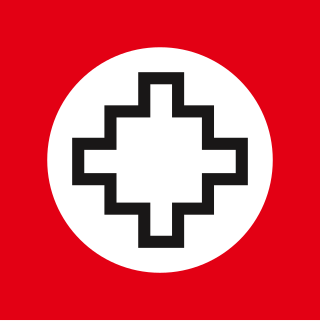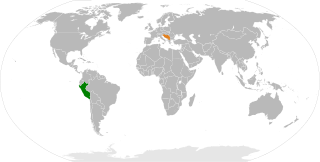Related Research Articles

The Peruvian Armed Forces are the military services of Peru, comprising independent Army, Navy and Air Force components. Their primary mission is to safeguard the country's independence, sovereignty and territorial integrity against any threat. As a secondary mission they participate in economic and social development as well as in civil defense tasks.

Juan Francisco Velasco Alvarado was a Peruvian general who served as the President of Peru after a successful coup d'état against Fernando Belaúnde's presidency in 1968. Under his presidency, nationalism, as well as left-leaning policies of state capitalism that addressed indigenous Peruvians, such as nationalization or agrarian reform were adopted. These policies were reversed after another coup d'état in 1975 led by his Prime Minister, Francisco Morales Bermúdez.

The Ethnocacerist movement is a Peruvian ethnic nationalist movement that espouses an ideology called ethnocacerism. The movement seeks to establish a proletarian dictatorship led by the country's Indigenous communities and their descendants. It draws on the ideas and history of Indigenous and anticolonial movements, including those of Juan Velasco Alvarado, Evo Morales, Abdel Nasser, Muammar Gaddafi, and Che Guevara. Ethnocacerism is considered an Indigenist ideology and is currently represented in mainstream politics by the Union for Peru party and other smaller parties. The ideology is followed by Peruvian militant groups like the Plurinational Association of Tawantinsuyo Reservists and Ejército de Reservistas Andino Amazónico – T.

Javier Diez Canseco Cisneros was a Peruvian politician and member of the Peruvian Congress representing the Socialist Party of Peru (PS), of which he was a founding member and also served as its Party President.
Law enforcement in Peru is carried out by two organizations under the direction of the Ministry of the Interior:
Doris Gibson Parra del Riego was a Peruvian magazine writer and publisher. She is most noted as the founder and editor of the Peruvian weekly news magazine Caretas.
Magaly Jesús Medina Vela is a Peruvian entrepreneur, presenter, radio and television producer; most known for the popular celebrity gossip show "Magaly TeVe", that ran from 1997 to 2012. In it, she talked about the lives and scandals of Peruvian celebrities from "Chollywood," a portmanteau of the words "Cholo" and "Hollywood," which she minted.

Héctor Béjar Rivera is a Peruvian author, university professor. He served as the minister of foreign affairs of Peru from 29 July 2021 until 17 August 2021.

The "Mariscal Domingo Nieto" Cavalry Regiment Escort is the Household Cavalry and Dragoon Guards regiment of the Peruvian Army since 1904, having been inactive from 1987 to 2012.

The Revolutionary Government of the Armed Forces was a military dictatorship that ruled Peru from 1968 to 1980 after a successful coup d'état by the Armed Forces of Peru.
The Annual Conference of Executives is an annual event for Peruvian business leaders, politicians and academics held in order to discuss topics related to business development and public policy. It is organized by the Peruvian Institute of Business Action (IPAE).

Peru–Yugoslavia relations were historical foreign relations between Peru and Yugoslavia. Both countries had amicable relations and were active in the Non-Aligned Movement which was established in Belgrade in 1961. Peru had an embassy in Belgrade until 2006 and Yugoslavia, later Serbia, had an embassy in Lima until 2009.

The Agrarian Reform in Peru was a process of land reform redistribution initiated in the 1960s by struggles of rural workers (campesinos) for their land in the Cusco Region, and legally implemented under General Juan Velasco Alvarado in 1969 through three distinct laws. These land reform laws sought to redistribute large amounts of land that had once been owned by indigenous populations to the rural populations that lived and worked in the lands. The proposed laws promulgated in 1969 would attempt to change Peru´s agrarian infrastructure from being a system dominated by haciendas. Which was characterized by the semi-feudal relationships between haciendas owned by private Spanish patrones which employed peones, a large indigenous group, large cooperatives controlled by the Peruvian state, and areas of land owned indigenous communities that were recognized by the Peruvian government. The land reform was predominately focused on redistributing land from private haciendas to rural communities. For the former hacendados, the government of Peru issued agrarian bonds as compensation for land expropriation.

The Revolution and the Land is a 2019 Peruvian documentary film directed by Gonzalo Benavente Secco and written by Gonzalo Benavente Secco & Grecia Barbieri. The film is about the 1969 agrarian reform carried out by the left-reformist military dictatorship, calling itself the "Revolutionary Government of the Armed Forces".
Francisco Igartua Rovira, better known as Paco Igartua was a Basque-Peruvian journalist and the founder and director of Oiga magazine in 1948 and, with Doris Gibson, of Caretas magazine in 1950.
References
- ↑ Bopp, John R. (2018-12-03). "Paco Igartua. 70 años de la revista "Oiga", la obra de un peruano muy vasco". About Basque Country.
- ↑ Pizarro Baumann, María Jimena (2023-03-14). La revista Oiga y el gobierno del general Velasco Alvarado: del apoyo a la oposición (1968-1975) (Thesis). PUCP.
- ↑ Dávila, Diana (2022-10-06). "¿Por qué dejó de venderse Oiga, revista en la que Magaly criticaba duramente a Gisela Valcárcel?". La República .